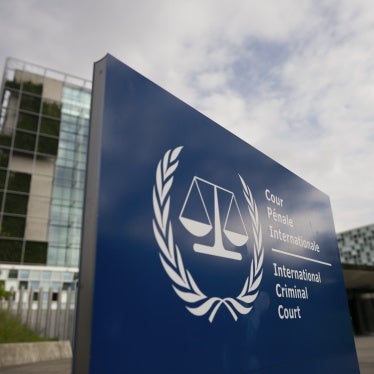The November 24-25 summit in Zagreb, with the participation of fifteen European Union (E.U.) states and Albania, Bosnia and Herzegovina, Croatia, Federal Republic of Yugoslavia, the former Yugoslav Republic of Macedonia and Slovenia, provides a unique opportunity for the E.U. to assess the transition in Yugoslavia and to improve the dialogue with the new authorities in Belgrade on a variety of issues, including human rights. As part of this dialogue, the E.U. should raise priority human rights issues including political prisoners, cooperation with the International Criminal Tribunal on the Former Yugoslavia (ICTY), legislative changes, reinstatement of judges and professors, accountability for past abuse, and the status of refugees.
There are encouraging initial signals that the authorities intend to provide redress for human rights violations perpetrated by the former government. For the future of the rule of law in Yugoslavia and the region, however, it is critically important that international actors, and the E.U. in particular, consistently press Belgrade to follow through on the positive steps undertaken so far. E.U. officials should make clear that eventual accession to the Council of Europe will hinge on attention to the crucial issues identified below, as will the disbursement of loans intended for general budgetary support. Human Rights Watch believes that humanitarian assistance, particularly to the health care sector and to municipalities, and assistance to nongovernmental organizations and the independent media should not be dependant on the central government's human rights record, but that other assistance should be strictly conditioned.The new Yugoslav president, Vojislav Kostunica, and the transitional governments in Serbia and Yugoslavia, dominated by the Democratic Opposition of Serbia (DOS), have expressed a wish to join the family of European democracies. The commitment that underlies this desire would prove credible if the authorities manifest a genuine respect for human rights and the rule of law. On such issues as the release of political prisoners and ICTY cooperation the new government can and should implement change as a matter of urgency. If the DOS makes as strong a showing as expected in the December 23 parliamentary elections and consolidates power, the authorities will also have the capacity to grapple with the remaining human rights and rule of law priorities.
Human Rights Watch recommends that the E.U. press for the following improvements in human rights and the rule of law:
Release of Political Prisoners
Correcting the severe violations of due process perpetrated against hundreds of imprisoned Kosovo Albanians is an essential part of upholding the pledge by President Kostunica to respect human rights and reestablish the rule of law in Yugoslavia. An estimated 600 Albanian political prisoners, charged with either terrorism or hostile activity against the state, are currently imprisoned in Serbia. Courts sentenced Kosovo Albanians on the basis of forced confessions, and judges frequently refused to admit exculpatory evidence.
These political prisoners should be released by presidential pardon or on the basis of an amnesty law currently being drafted by the Yugoslav Ministry of Justice. This must be done promptly, given that these prisoners have been unjustly deprived of liberty for eighteen months or longer.
Cooperation with the International Criminal Tribunal for the former Yugoslavia (ICTY)
Consistent with Yugoslavia's international obligations, the authorities should cooperate to the fullest extent with the International Criminal Tribunal for the former Yugoslavia. Such cooperation in establishing the rule of law is a necessary condition for Yugoslavia's reintegration into Europe. This cooperation includes several specific measures:
- Quickly authorizing the opening of an ICTY office in Belgrade;
- Complying with requests by the tribunal to provide assistance in relation to investigations and prosecutions. This includes, but is not limited to, allowing representatives of the ICTY Office of the Prosecutor access to Yugoslav territory; the identification and whereabouts of persons, the collection of evidence, including testimony under oath and material evidence; the serving of documents; the execution of searches and seizures; and the protection of victims and witnesses;
- Taking all possible measures to protect and safeguard documentation potentially relevant to ongoing investigations and future trials before the tribunal; and
- At the earliest opportunity, apprehending and transferring to the ICTY those individuals indicted by the tribunal.
Human Rights Watch is aware of the argument occasionally raised by Yugoslav officials that transfer to the ICTY is barred by a constitutional provision prohibiting extradition of Yugoslav citizens. However, transfer to an international tribunal constitutes surrender, and not "extradition"—which is the delivering up of a person by one state to another. For this reason, Human Rights Watch believes that the constitutional provision in question does not apply.
Amnesty for Draft Evaders
General amnesty should be declared for Yugoslav citizens who, in the absence of provisions for the determination of conscientious objector status or non-punitive alternative service, refused to be drafted or deserted during the war in 1999. Yugoslav human rights groups and lawyers believe that 10,000 criminal proceedings of this nature are under way, or already concluded with prison sentences, against draft evaders and deserters. A draft law, currently under consideration by the Yugoslav Ministry of Justice, provides for amnesty, and the parliament should uphold such a measure.
Legislative Changes
Legislation curtailing fundamental human rights in Serbia should be repealed or amended as soon as the new Serbian parliament is elected and convenes. This should include the annulment of the 1998 University Act and the Public Information Act of October 1998, which have severely restricted academic freedom and freedom of information. New laws on the universities and the media should be crafted in cooperation with professional associations and nongovernmental organizations with expertise in thes respective areas.
The parliament should amend the Serbian Penal Code to eliminate the death penalty, which is currently provided for certain types of murder in articles 47 and 169.
The federal Criminal Procedure Act should be amended to provide explicitly for detainees' right to counsel immediately after detention and for law enforcement officers' obligation to inform detainees of their right to counsel. The absence of such provisions has been used by the police to physically abuse detainees to coerce them into confessions.
A revised electoral law and regulations should be adopted to regulate the December 23 parliamentary elections in Serbia and the federal elections, which are likely to take place in 2001. Provisions in existing legislation that have enabled those in power to manipulate the electoral process must be eliminated. In particular, the following changes should be made: polling boards and electoral commissions should not be dominated by any political group; voting in the military should be administered by multiparty civilian agencies; all established candidates should have access to the media; the process of production and distribution of ballots should be transparent; voters should be able to countersign at the voting register in the polling station; and the work of the Organization for Security and Cooperation in Europe and domestic election monitors should be unimpeded.
The Yugoslav parliament should amend the provisions on conscientious objection in the Law on the Armed Forces. The law mandates a punitive 24-month period for civilian service (article 296(2)), twice as long as armed service, and civilian service is required to take place in Yugoslav Army units or other military institutions (article 297(1)). The Federal Constitutional Court has ruled that conscientious objection cannot be invoked when an individual who has already performed military service is called up to do reserve duties that involve taking up arms. The law should reduce the length of the civilian service, provide for service in civilian institutions, and protect a person's right to adopt new beliefs, as part of the right to freedom of thought, conscience and religion.
Reinstatement of Dismissed Judges, Professors, and Journalists
Judges removed from their posts for political reasons during the Milosevic period should be promptly reinstated by the Serbian parliament to be elected in the December 23 elections. Two judges of the Supreme Court of Serbia, one judge of the Constitutional Court, and seventeen judges of district, municipal, and commercial courts were removed in December 1999 and July 2000, although the Supreme Court had not pronounced upon the proposed removals, as required by law.
The government of Slobodan Milosevic dismissed around one hundred professors and assistants at Belgrade University after the enactment of the oppressive University Act of 1998. The new Serbian Minister of Education has authorized each faculty to convene a commission to examine, on a case-by-case basis, all appointments and dismissals made under the 1998 act, thus avoiding the imposition of retroactive legislation or a blanket decision regarding faculty members hired since May 1998. The reviews should be carried out in a manner free of political pressure. In those instances where review commissions find that faculty members were fired for their political opposition to the Milosevic government, the affected faculty members should be invited to resume their old positions, or if that is not possible, offered a comparable position.
Hundreds of journalists at the state-owned Radio Television Serbia were sent on compulsory leave for political reasons under the previous government, and at least four were fired. They should be given an opportunity to return to their positions, and those who have sued the RTS for the years of forced leave should be granted compensation.
Bringing Human Rights Abusers to Justice
The new authorities should take urgent measures to hold accountable the perpetrators of political killings, abductions, torture, illegal detentions, and violence against political opponents, and other abuses committed or alleged to have been committed by the forces of or the authority of the Serbian Ministry of Interior.
Position of Refugees and Displaced Persons
The new authorities should fully cooperate with the international community, and the UNHCR in particular, on the resolution of the status of refugees and displaced persons in Yugoslavia. The refugees should be given full and undistorted information on the return process in Bosnia and Herzegovina and Croatia, in order to enable them to make informed decisions on whether to return.







